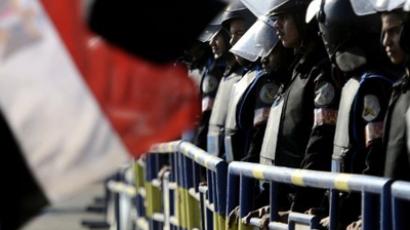NGO crackdown in Egypt as people vote for Islamists
As Egyptians head back to the polls for a third round of parliamentary elections, tensions between protesters and the ruling generals are again on the rise. The authorities say NGOs are fostering dissent, and are applying pressure as a result.
The first two rounds of voting yielded a major success for Islamist parties, notably the Freedom and Justice Party linked to the moderate Muslim Brotherhood, and the more orthodox Salafi party, Al-Nur. The current two-day poll is not expected to change that situation. Continuing protests in Egypt have spurred the ruling Supreme Council of the Armed Forces to speed up the electoral process. It will continue with a two-stage ballot to select members of the upper chamber of parliament in late January and mid-February. The run-up to the third round of voting has seen new clashes between the army and protesters, as well as police raids on non-governmental organizations. RT’s Irina Galushko spoke to activists of one such NGO, who are still puzzled about why their offices were searched.Members of the Arabic Centre for an Independent Judiciary never did get an official explanation for the confiscation of their laptops and documents, or for their subsequent eviction from their office.“We don’t know what they were searching for. We told them we could give them anything they wanted, but they came in, searched everything, and didn't give a simple answer, whether they wanted bank statements, or anything else,” Hoda Abdel-Wahab, executive director of the organization, told RT.Sitting on a sidewalk by their former office, the evicted NGO workers point out a certain irony. This never happened when Hosni Mubarak was in charge.Human rights activists in Egypt believe the raids are attempts to punish them for accusing military rulers of failing to carry through democratic reforms.But Western observers say the authorities are becoming increasingly wary of the ever-watchful eye of Washington. And the true purpose of raids is to prove foreign funding of organizations which the authorities accuse of destabilizing Egypt.“There seems to be a strand of opinion inside the military and state machine that is very disillusioned with the old friendship with the West, and may be trying to find evidence to prove that some trouble on the streets and Tahrir Square has been in some way fostered by these NGOs,” says Mark Almond, Visiting Associate Professor at Bilkent University.Washington tirelessly repeats the old adage of the importance of its relations with Egypt as a key player in the Middle East. But the seemingly polite talk may hide a very different agenda.“Washington doesn’t want stabilization, they want permanent unease so that they can use that as a lever in the entire region,” believes historian and journalist F. William Engdahl.And Egyptian activists are uneasy about accepting Western help, which they say could do more harm than good.“I don’t like the way foreign countries put pressure on the Egyptian authorities. That pressure has to come from the Egyptians, and we as a human rights organization should provide it,” says Abdel-Wahab.Whatever the real reasons for the raids of NGO offices, the increasing internal strife in the country could portend a shipwreck not just for Egypt's relations with the West, but for the country's revolution.
Middle East expert Tariq Ali told RT that in order to stabilize Egypt, the military has no other choice but to give the people what they want – and step down.“A large majority of Egyptians want the military to be a defensive outfit, defending the country against outside attack or intervention, and not play a political role at all,” Ali said. “For the last 30 to 40, years Egypt has essentially – whether under Mubarak or Sadat – been under a dictatorship run by the military, and people want an end to that. ““Attacking these NGOs is an attempt to show that foreign powers are manipulating the country which is, again, nonsense,” he added. “I think Washington has a great deal of influence within the Egyptian military, after all, they pay it billions of dollars.”














